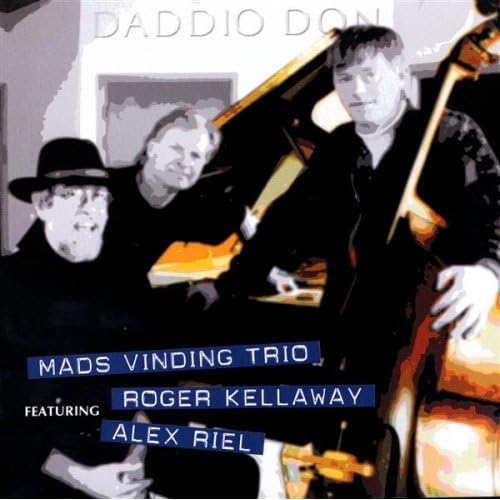| Image courtesy of soundcloud |
Recent listening, current
Archived listening, 2013-2016
Thursday, April 24, 2014
193. Mads Vinding Trio / Daddio Don (1998)
A while back, I recommended an album with Mads Vinding to a friend who loves the upright bass. It's his favorite instrument. We chatted about the Danish bassist and both agreed he's a hard one to not like. A few weeks later he gave me some CDs that, for whatever reason, didn't pan out for him the way he expected. It happens. But I was thrilled because among them was Daddio Don. I listened to it for the rest of the afternoon before promoting it to a coveted spot in the rotation of my daily commute. Vinding is impossible to keep up with, the tireless recording and performing artist for whom the word "prolific" seems inadequate. He's all over the map, discographically speaking, but always right where you need him with the soulful interplay, keen rhythmical knack, and melodic inventions that surpass keeping time for the time's sake. He has a sixth sense for interplay, or a humble ear for the group dynamic, always listening to what the other musicians are doing. I appreciate his earnest touch with the blues and immediate facility for navigating uptempo and bebop that remind me of Ray Brown (another favorite musician). His choruses are not boring, they're more like short songs. To paraphrase C. Michael Bailey's piece for AllAboutJazz.com, Vinding is like the Nordic George Mraz, expressing himself with a confident stride and robust tone that tricks the ear into hearing a full rhythm section where none is present. The trio is comprised of Vinding, drummer Alex Riel, and pianist Roger Kellaway. Kellaway has a sensitive understanding of the piano's dynamics, and moves with irresistible swing.
More importantly, Kellaway has a penchant for odd time signatures (the album is titled for Don Ellis), and all three musicians are comfortable breezing through meters like Kellaway's "Seven," or Thad Jones' "A Child is Born" in 11/8. Riel's timekeeping is sumptuously alert. His dreamy brush work is punctuated by pertinent, percussive accents and taut interjections on the snare that make the emotive and pensive, often introspective set as lush and flush as a well arranged quintet. "How Deep is the Ocean" is intriguing, demonstrating the shared chemistry of the trio. It's a touch faster than is typical, and the order of its open sections are negotiated as you hear them. It typifies the musical cooperation which is the album's hallmark. If you're the type of listener that enjoys quiet spaces with tricky corners, a shared creation of three musicians that reveals the sheer clumsiness of language when describing a mere "piano" trio, then Daddio Don needs to be on your list. And if you try it but you don't enjoy it, perhaps you can pass it on to a friend.
Labels:
1998,
alex riel,
bass,
daddio don,
drums,
mads vinding,
piano,
piano trio,
roger kellaway,
stunt records,
trio
Subscribe to:
Post Comments (Atom)

No comments:
Post a Comment